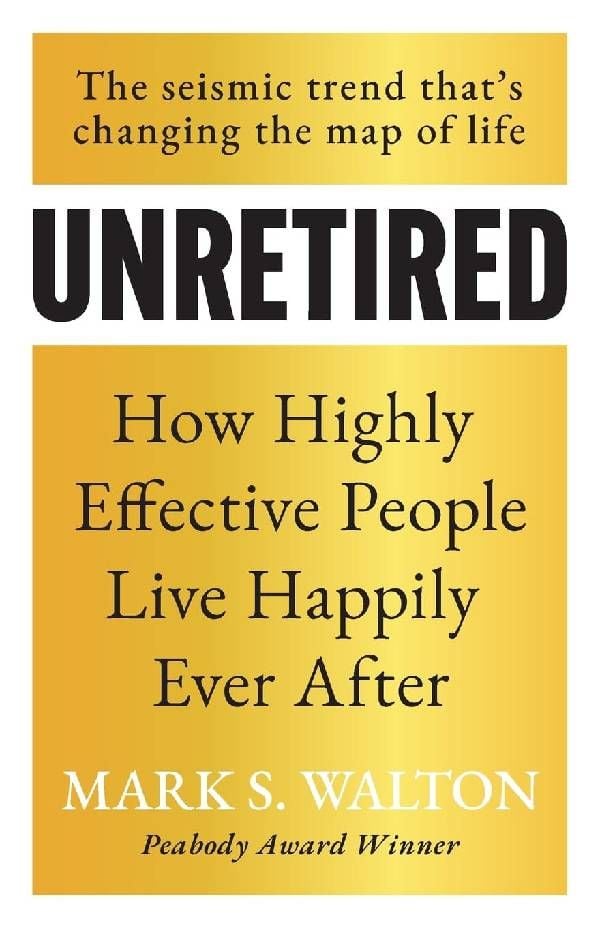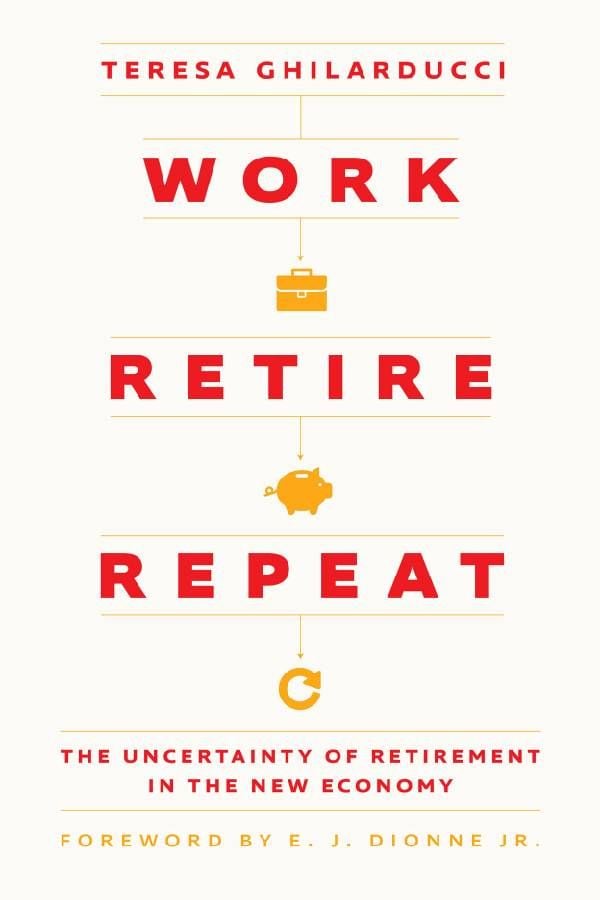A Spirited Exchange About Working in Retirement
Why the authors of ‘Work, Retire, Repeat’ and ‘Unretired’ are poles apart about working longer
Of all the latest books about retirement, you'd be hard pressed to find two more different than these: Teresa Ghilarducci's "Work, Retire, Repeat: The Uncertainty of Retirement in the New Economy" and Mark Walton's "Unretired: How Highly Effective People Live Happily Ever After."
Next Avenue thought it would be interesting to bring those authors together on Zoom and let them share their perspectives. So, we did.

Turns out, Ghilarducci, a progressive New School economics professor, and Walton, an award-winning journalist and leadership educator, agree on several aspects of retirement in America but have alternative takes on working in retirement.
Ghilarducci explained that her research shows that working in retirement is more difficult than many experts have insisted. She sees an ugly retirement crisis, particularly among older lower-income and minority adults. For his book, Walton interviewed chipper people working in retirement who he calls "knowledge executives and professionals."
Here are highlights from the conversation Next Avenue contributor Richard Eisenberg had with Ghilarducci, who was attending the recent American Society on Aging conference in San Francisco, and Walton, who spoke from his Palm Springs, California, home:
Defining Retirement Today
Next Avenue: What do you think the word 'retirement' means these days?
Teresa Ghilarducci: Retirement is a highly personal decision and varies by socioeconomic class, race, gender and luck. What I discovered is that most people who say they are retired were pushed out or laid off or had to leave because of their health, their sense of declining abilities or their spouse's care needs.
What did you and your research colleagues find about people working in retirement?
"Retirement is a highly personal decision and varies by socioeconomic class, race, gender and luck."
Ghilarducci: We found that when people said they were retired but also worked part-time, those jobs were often temporary and more likely to be lower paid than their career jobs, somewhat substantially.
We also found that 20% of people between 62 and 70 were working, but also collecting Social Security. So, it meant that instead of using work to delay and get a higher Social Security benefit, they were using Social Security to supplement their low wages.
You wrote that every time you congratulate someone on their retirement, you hear what you call 'shame, tinged explanations.' What's going on there?
Ghilarducci: I think that only happens in America, where the word 'retirement' denotes disuse and uselessness. There is this idea that if you can work, you have value. And there is a sense that if anybody has a pension, they're greedy geezers. So, there's shame about earned leisure.
A Unique American View
If you ask a 67-year-old woman if she's retired, she hangs her head in shame and says, 'Well, yeah, kind of, but I really am doing something.' And then she makes a list of all the productive things she does. Whereas a French woman at 67 puts on her red lipstick, her scarf and says, 'Yes, I'm retired and I'm going out to lunch.'
Mark, how do you define retirement and unretirement?
Walton: I tend to use the layman's definition that working is working, whether it's full-time or part-time, and being retired is not working.
Your book is called "Unretired." What does that word mean to you?
Walton: It means working. I would guess that perhaps 30% of the folks I interviewed are working part-time of their own choice; the rest are working full-time.
Teresa's research is primarily about folks who would like to retire at some point but cannot, and may not ever be able to, afford it. They need to work. Mine is about people who could afford to retire for the most part and have no interest in it.
Retirement and Personal Identity
Mark, you wrote, 'the more successful you've been in your career, especially financially, the more likely you are to feel like a failure in retirement.' Why is that?
Walton: It's a matter of loss. Losing your identity in a traditional retirement is extraordinarily painful.
Ghilarducci: Can I add to that? I was going to name this book 'In Praise of Retirement,' but it became more complicated than that ... If you retire, you have to decide who you are without a boss or the identity of your job. I think it's a very sensitive period.

That's the growth work we have to do. You don't need a boss to structure your day or to create personal interactions. It's self-knowing in the service of growth. When people do that, it doesn't really matter if they're employed or not.
Mark, what makes for a successful unretirement?
Walton: What I found is that there are three building blocks: fascination, flow and generativity.
Successful unretired people not only love their work, they're fascinated with it. It naturally pulls them forward.
Highest Form of Happiness
By putting the fascination to work, they experience flow — the highest form of human happiness, according to Greeks.
And then, there's paying it forward and being generative.
Ghilarducci: That's nice. What I want is for everyone to have a pension so they can sit down at a certain age and decide: 'What fascinates me? What gives me flow? What gives me generativity?'
If you don't have time to do that, you die in your boots or you die struggling.
Teresa, your book's subtitle is 'The uncertainty of retirement in the new economy.' What does that mean?
Ghilarducci: There's an uncertainty, a desperation that you'll never be able to retire. And the new uncertainty lifts up the growing reality-based anxiety that we cannot afford to grow old in America.
A Gigantic Experiment
The new economy is the product of the last 40 years of experiments providing economic security. One place we experimented is in pensions and retirement. We loaded in a lot of insecurity into those systems.
401(k)s?
Ghilarducci: Yes, and not helping pension plans flourish where they could. Congress was struggling to give more and more tax incentives to employers and employees to have a retirement plan. But the only people that respond to that are the very wealthy. So, you had this growing inequality.

The other part of the uncertainty of unretirement is the appalling difference in longevity by socioeconomic class.
When I read your two books, I felt they were polar opposite views about working longer and working in retirement. Mark was very optimistic and Teresa was pretty pessimistic. Would you characterize it that way or do you think I've got it all wrong?
Ghilarducci: It really is a tale of two retirements.
Walton: Absolutely. I would say my book is optimistic for people who can afford to seize the opportunity of continuing to work at things that fascinate them as long as they want to.
Teresa, you have this phrase in your book, 'the working longer consensus.' And I felt guilty as I was reading it because I feel like I'm part of that. The consensus is comprised of people who've said: 'We just need to work longer and that'll take care of retirement insecurity and solve retirement crisis.' But you're not buying it.
Ghilarducci: Yeah. My friend, the economist Alicia Munnell, wrote a book saying that if everybody just extended their work life one or two more years, they could make it. I've spent years refuting that assumption, asking: 'It works on the spreadsheet, but does it work in practice?' And I found that for most people it doesn't work.
Working Longer Doesn't Work
That's because of age discrimination and health issues for older workers?
Ghilarducci: Yes. Most will get pushed out. Even when people work longer, their wages are so low because wages have not kept up. They have to collect their Social Security. They've had to draw down their 401(k)s.
So, all the good things that come from working — delaying Social Security collecting and saving more — aren't happening for most of the people who are working.
"Everyone I've spoken to who is unretired tells me the same thing about themselves: They feel better."
Mark, you found that working in retirement was making unretired people happier and maybe healthier.
Walton: Everyone I've spoken to who is unretired tells me the same thing about themselves: They feel better. They consider themselves to be healthier and expect to be healthy for however long they continue to work.
But Teresa, studies you wrote about found that people working in retirement often run into worse physical and mental health issues than before. Can you talk about that?
Ghilarducci: If you're forced to work because of economic necessity past 62, you are more likely to hasten your morbidity and your mortality. There does seem to be a straight line to that.
It's especially true for women because they're often in physically difficult jobs — home health care, warehouse work. If you have had those kinds of jobs and that socioeconomic status, you're more likely to have some metabolic disorder. The class inequities just accumulate.
Proposing a Gray New Deal
Teresa, you've proposed The Gray New Deal to help people retire better or work in retirement if they want to. What is that?
Ghilarducci: The Gray New Deal requires worker training and Medicare being paid to people who are aged 60 or 65. But the most important thing to make work better is to make pensions better. We have to have universal access to a pension plan.
You want guaranteed retirement accounts where every employer would be required to offer a retirement plan that they and their employees would contribute to, right?
"Reflect on what fascinated you in your 20s and 30s ... that might be the basis of your future success."
Ghilarducci: I've updated that because that's hard. Democrats are for it; Republicans are against it. But Republicans are for a modification where everybody who doesn't have a plan will be in a government plan. We won't force the employers to do anything.
The Republicans changed my mind. That's actually a good idea. Just get the employers out of it and just have the government provide an account on top of Social Security.
Teresa and Mark: What's your advice for people in their 50s and 60s about retirement or working retirement?
Ghilarducci: Do a risk assessment of whether or not you can stay in the labor market in your 60s. Your Plan B should be very strong.
Walton: The advice I've heard from people who have continued to work is that somewhere around 60-something, it's helpful to reflect on what fascinated you in your 20s and 30s that you may have given up to do whatever it is you did to become a doctor or a lawyer or a stockbroker.
That might be the basis of your future success. Take it seriously.


